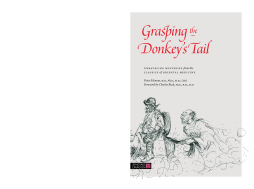
Additional Information
Book Details
Abstract
A scholarly yet practical account for modern clinicians of some of the key difficult questions arising from obscure passages in the classics of Chinese medicine. This book offers an interpretation of crucial sections from the classical Chinese texts which have continued to puzzle Western clinicians, and serves as a basis for more effective acupuncture treatments.
The author discusses Sasang medicine interpretations of specific phenomena, showing where Korean medicine diverged from Chinese, and how the two traditions can inform each other, and the modern acupuncturist. Elsewhere, he discusses the Daoist roots of Chinese medicine, the fundamental differences between Oriental and Western medical approaches, as well as various important issues in pulse diagnosis, all of which have practical application for modern clinicians and students.
Peter Eckman's wide perspective allows him to connect acupuncture with the traditional Chinese sources (Yijing, Taoism..) and to unravel them within clinical practice.
Jean-Marc Kespi, Honorary President of The French Association of Acupuncture
While this text will serve as an essential philosophical and textual primer for the student, every page contains doors that beckon the advanced practitioner to travel deeply inward. Inspired by the classic texts, Peter shares a lifetime of experience to illuminate their deeper meanings and import for the contemporary practitioner. Chinese medicine is in good hands.
Lonny Jarrett, MAc., Author of Nourishing Destiny: The Inner Tradition of Chinese Medicine
This work is very interesting from an intellectual perspective from any student or practitioner of East Asian medical traditions, as also has gems of application to practice in the clinical situations.
Duncan McGechie, Acubody
The book's essence, distilled into a single word, is 'resonance', its aim being to shed new light on old wisdoms contained in the classics of Chinese medicine...This latest offering is a slim volume but offers big, practice changing ideas for those in the profession...Although the volume is lightweight, it packs a lot of information and the many footnotes show just how thorough the author has been with his research. No stone is left unturned in pursuit of what the ancients were intending to convey. I loved how his observations and theories are soundly backed up with clinical experience...This is a delightfully ambitious book that you will want to read more than once.
Sally Crowther
Acu, Issue 16, Autumn 2017
Peter Eckman has been a full time acupuncturist for forty years and is an international teacher and published author in the field. He studied under J.R. Worsley, T.W. Yoo and D.W. Kuon, three of the most influential acupuncture teachers of the 20th century, and currently practices in San Francisco, California, USA.
Peter Eckman's eclectic explorations, and most importantly their clinical applications, have contributed greatly to the ongoing process of synthesis, serving to further what Joseph Needham called a confluence of East Asian and modern Western science.
Andrew Prescott, Former Clinic Director at Jung Tao School of Classical Chinese Medicine, USA
An innovative and essential text for acupuncturists and Chinese medicine students and practitioners...It is a book to come back to, to reflect on, to inspire one's own research and investigation. Grasping the Donkey's Tail raises questions about the nature of health, disease, acupuncture and the human's place between Heaven and Earth, that will be interesting for practitioners of any style of acupuncture who are interested in how the classics can be relevant for contemporary practice.
Olga Fedina
The Journal of Chinese Medicine
Table of Contents
| Section Title | Page | Action | Price |
|---|---|---|---|
| Grasping the Donkey’s Tail: Unravelling Mysteries from the Classics of Oriental Medicine by Peter Eckman | 5 | ||
| Foreword by Charles Buck | 11 | ||
| Acknowledgments | 17 | ||
| Preface | 19 | ||
| Introduction | 21 | ||
| Chapter 1. Yì Jīng (The Classic of Changes) | 25 | ||
| Chapter 2. Laˇo Zıˇ or Dào Dé Jīng (The Way and Its Power) | 39 | ||
| Chapter 3. Huái Nán Zı | 47 | ||
| Chapter 4. Sù Wèn (Simple Questions) | 69 | ||
| Chapter 5. Líng Shū (Spiritual Pivot) | 79 | ||
| Chapter 6. Nán Jīng (The Classic of Difficulties) | 101 | ||
| Chapter 7. Mài Jīng (The Pulse Classic) | 119 | ||
| Addendum: Pinning the Tail on the Donkey | 137 | ||
| References | 149 | ||
| Blank Page |
